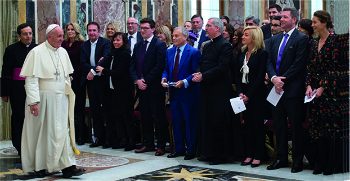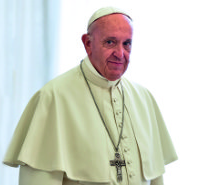Climate change
Today’s ecological crisis, especially climate change, threatens the very future of the human family. For too long we have collectively failed to listen to the fruits of scientific analysis and “doomsday predictions can no longer be met with irony or disdain” (
Laudato Si’, 161).
Global warming
A significant development in this past year was the release of the “Special Report on the impacts of global warming of 1.5°C above pre-industrial levels”, by the Intergovernmental Panel on Climate Change (IPCC). That Report clearly warns that effects on the climate will be catastrophic if we cross the threshold of 1.5ºC outlined in the Paris Agreement goal. The Report warns, moreover, that only one decade or so remains in order to achieve this confinement of global warming. Faced with a climate emergency, we must take action accordingly, in order to avoid perpetrating a brutal act of injustice towards the poor and future generations. We must take responsible actions bearing in mind their impact in the short and in the long term.
The poor suffer the most
In effect, it is the poor who suffer the worst impacts of the climate crisis. As current situations demonstrate, the poor are those most vulnerable to hurricanes, droughts, floods and other extreme climatic events. Courage is surely required, therefore, in responding to “the increasingly desperate cries of the earth and its poor”. At the same time, future generations stand to inherit a greatly spoiled world. Our children and grandchildren should not have to pay the cost of our generation’s irresponsibility. Indeed, as is becoming increasingly clear, young people are calling for change (cf. Laudato Si’, 13).
A just transition
Your meeting has focused on three interrelated points: first, a just transition; second, carbon pricing; and third, transparency in reporting climate risk. These are three immensely complex issues and I commend you for taking them up.
A just transition, as you know, is called for in the Preamble to the Paris Agreement. Such a transition involves managing the social and employment impact of the move to a low-carbon society. If managed well, this transition can generate new jobs, reduce inequality and improve the quality of life for those affected by climate change.
Carbon pricing
Second, carbon pricing is essential if humanity is to use the resources of creation wisely. The failure to deal with carbon emissions has incurred a vast debt that will now have to be repaid with interest by those coming after us. Our use of the world’s natural resources can only be considered ethical when the economic and social costs of using them are transparently recognised and are fully borne by those who incur them, rather than by other people or future generations (cf. Laudato Si’, 195).
Transparency
 The third issue, transparency in reporting climate risk, is essential because economic resources must be deployed where they can do the most good. Open, transparent, science-based and standardised reporting is in the common interests of all, enabling financial capital to move to those areas that support “the fullest possibilities to human ingenuity to create and innovate, while at the same time protecting the environment and creating more sources of employment” (Laudato Si’, 192).
The third issue, transparency in reporting climate risk, is essential because economic resources must be deployed where they can do the most good. Open, transparent, science-based and standardised reporting is in the common interests of all, enabling financial capital to move to those areas that support “the fullest possibilities to human ingenuity to create and innovate, while at the same time protecting the environment and creating more sources of employment” (Laudato Si’, 192).
Dear friends, time is running out! Deliberations must go beyond mere exploration of what can be done, and concentrate on what needs to be done. We do not have the luxury of waiting for others to step forward, or of prioritising short-term economic benefits. The climate crisis requires “our decisive action, here and now” (Laudato Si’, 161) and the Church is fully committed to playing her part.
In our meeting last year, I expressed the concern that “civilization requires energy, but energy use must not destroy civilization!” Today a radical energy transition is needed to save our common home.
There is still hope and there remains time to avoid the worst impacts of climate change, provided there is prompt and resolute action, for we know that “human beings, while capable of the worst, are also capable of rising above themselves, choosing again what is good, and making a new start” (Laudato Si’, 205).

 Entries(RSS)
Entries(RSS)